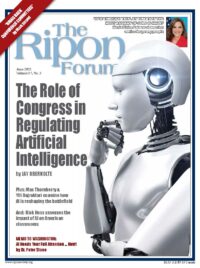
America has prided itself on providing refuge to immigrants fleeing persecution for centuries. In the late 1960s, Congress formalized that commitment into law. Over 50 years later, however, our refugee policies are unrecognizable to the point of being almost meaningless. It is well-past time for a significant course correction.
Following the original 1952 Immigration and Nationality Act (INA), which did not include any provisions regarding refugee or asylum protections, the INA Amendments of 1965 added a conditional entry for aliens who demonstrated persecution on account of race, religion, or political opinion, and had fled a Communist or Communist-dominated country or any country in the Middle East. In 1968, the U.S. acceded to the 1967 United Nations Protocol Relating to the Status of Refugees, which incorporated the 1951 United Nations Convention Relating to the Status of Refugees, in which the United States had not participated. Besides getting rid of the geographic limitation, signing on to the international agreement meant expanding the three grounds on which an alien could claim persecution to include nationality and the undefined membership in a particular social group (PSG).
Unfortunately, enforcing these measures has proven more difficult. Today, the U.S. has needlessly made the administration of providing refugee protection confusing by creating two separate paths and processes: An alien overseas applies for refugee protection, while an alien at our border or inside the U.S. applies for asylum. In both scenarios, the applicant must prove the same elements, per the Protocol described above, but the former is much more orderly and manageable than the latter.
Today, the U.S. has needlessly made the administration of providing refugee protection confusing by creating two separate paths and processes: An alien overseas applies for refugee protection, while an alien at our border or inside the U.S. applies for asylum.
Through the U.S. Refugee Admissions Program, the U.N. High Commissioner of Refugees refers a refugee application — typically from one of the regional refugee camps or resettlements located around the globe — to the State Department. The Department of Homeland Security’s U.S. Citizenship and Immigration Services (USCIS) then interviews the refugee applicant overseas and adjudicates the case. If granted, the applicant is vetted by Department of Homeland Security, Department of Justice, and members of the Intelligence Community before the refugee is flown to the U.S. The process usually takes at least 12 months. The number of refugee cases the U.S. resettles is capped annually and the law requires nongovernmental organizations to notify U.S. state and local communities before resettlement to ensure there are adequate housing and employment opportunities.
It is important to note that financially, a country like the U.S. can help more persecuted people in their own regions of the world than by resettling a relatively smaller number of people in the U.S., far from their home country, familiar language, culture, and more. Keeping people safe in or near their home country also makes it more likely that they will return home when country conditions improve to help rebuild.
Conversely, our asylum system is used by those aliens who are already in the U.S. or are at our doorstep. The benefits of vetting overseas — in or near the applicant’s country, where criminal or other relevant information can more easily be obtained — are lost. The U.S. government simply does not have the resources or the time to investigate and verify the volume of asylum claims that are made each year. And yet, by offering aliens a work authorization document — the true benefit that most people coming to the U.S. seek — just six months after they complete their application, our system incentivizes asylum.
By offering aliens a work authorization document—the true benefit that most people coming to the U.S. seek—just six months after they complete their application, our system incentivizes asylum.
Furthermore, there is no annual cap on asylum applications and no fee for the application. With nearly 9 million benefit applications pending at USCIS and over 2.2 million cases in the immigration court backlog, aliens know that filing an asylum application buys them years here in the U.S., during which time they can work, have U.S. citizen children, and put down roots, making their deportation less likely. This low-risk, high-reward incentive structure is a recipe for fraud, which is reflected by the fact that Immigration Judges granted only 14 percent of asylum cases in 2022. The results of this policy are bad for the U.S., of course, but they also hurt other countries because they makes it less likely that aliens will return home to rebuild when conditions improve.
In recent years, the Left has compounded our asylum system’s problems with its open border policies and rhetoric. From the beginning of his campaign, President Biden encouraged mass illegal immigration, and millions of people from over 160 countries have responded, turning themselves in on our border. Homeland Security Secretary Alejandro Mayorkas refers to these masses as “asylum seekers” and “vulnerable populations.” He releases most of them into the U.S. and encourages them to apply for asylum even though he has admitted that most are not eligible for the benefit.
The Left has also shoehorned an ever-widening number of circumstances into the “membership in a particular social group” ground that was originally added by the UN Protocol. Today, being a domestic violence victim, living in a country with general crime and violence, and their go-to villain, climate change, all constitute grounds for relocation. Never mind that none of these circumstances involve either membership or a social group. The Left has taken our refugee policies far-afield from their original intent and purpose to achieve its open border agenda.
To restore a lawful, orderly, and manageable process to asylum and refugee protection, Congress should: rescind PSG as an overly broad ground for protection and return to more objective and immutable characteristics as the basis for persecution; take into account the number of pending asylum cases at both USCIS and in the immigration courts and set a combined, manageable annual cap for both asylum and refugee cases; prohibit aliens illegally crossing our border between ports of entry from applying for asylum; reinstitute the “Remain in Mexico” program so that would-be migrants know they won’t be released into the U.S. by merely saying a few words of fear at the border; require implementation of the safe third country concept — which requires an alien to be returned to the first safe country in which they entered to apply for asylum there — to end country shopping; prohibit work authorization unless and until an asylum application is granted rather than tie it to merely filing the application; provide immigration judges with summary judgment authority to quickly remove frivolous cases, thus greatly reducing the court backlog; and require USCIS to charge a fee for asylum applications.
The fraud and abuse of America’s refugee and asylum protection systems have rendered our second most important immigration benefit — after U.S. citizenship — almost meaningless. This harms not only the integrity of our immigration system, but also those who were truly persecuted because their applications are buried among the many millions of pending cases and they must wait years longer for a decision. It is past time for Congress to end the fraud and decrease the backlogs so those who merit protection can receive it in an expeditious fashion, and those who are not eligible are quickly denied and removed.
Lora Ries is Director of The Heritage Foundation’s Border Security and Immigration Center.




